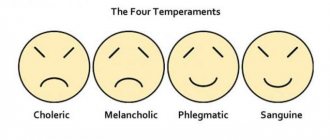In the modern world, there are two types of people - those who rely on themselves, and those who place responsibility on external factors. Scientifically speaking, people who attribute their successes and failures to internal factors have an internal locus of control, while adherents of the opposite position, who see the main reason for what is happening in their lives in external circumstances, other people and fate, have an external one. ) locus of control. Both of these life positions occur frequently, and are usually easily observed in behavior and communication. A person’s ideas about what determines significant (and not only) events in his life have a great influence on the formation of his personality and worldview.
Behavior, motivation, conformity, nonconformity, social skills, ability to socialize and communicate can all be highly dependent on locus of control.
"Means no luck!"
Externals. These people are convinced that not everything in life depends on them. They usually believe in the existence of some kind of order, fate, evil fate, God, space, chance (and other external factors) that influence their lives.
Externals are usually focused on society - they easily make new acquaintances, establish social contacts, are active, know how to maintain subordination, are good subordinates and performers, are able to adapt to changes in external circumstances, know how to work in a team, are flexible in communication, passionate and easy-going. Another good bonus is the fact that they accept failures quite easily, because externalities shift responsibility for the origin of the latter onto other people and circumstances.
The main disadvantage of people with an external locus of control is that they are highly dependent on public opinion and other external factors. The consequence of this is unstable self-esteem, which can fluctuate greatly under the influence of the opinions of others. To bolster self-esteem and gain approval from other people, they often resort to conforming behavior. The main danger is that by agreeing with others, externals can go against their desires, sometimes without even realizing their essence. People with an external locus of control find it difficult to work alone, since constant feedback is important to them, they do not have enough internal motivation, and they are often afraid to take initiative.
Externals are anxious and sensitive, but being oriented toward the outside world helps them understand others, show empathy, and have a keen sense of changes occurring around them.
In existential psychology, there is a defense mechanism “faith in the ultimate savior”, through which a person is protected from the anxiety of death. He thinks that there is someone (something) that will protect him from death, as a result of which he behaves passively in relation to the world (passively lives life), excluding the experience of his own strength. To the extreme degree of manifestation, such a mechanism is characteristic of victims, addicts, and people with masochistic manifestations. This strongly resonates with extreme forms of external locus of control.
“Man is the creator of his own destiny”
Internals. These people usually rely on themselves for everything. They are independent, inquisitive, well aware of their needs and desires, diligent, success-oriented and result-oriented, self-critical, independent, nonconformists, with more stable and adequate self-esteem. Internals strive for constant development of personal qualities and abilities. Increasing competence and expanding knowledge are among the interests of people with an internal locus of control; they love to learn, strive to achieve power and control over the situation and environment.
At the same time, internals are quite rigid and adapt to external changes much worse than externals. By taking responsibility for everything that happens, they greatly risk their mental and, sometimes, physical health. Attempts to control everything around and high expectations are very draining; any failure can cause a strong blow to self-esteem and mental state, which can result in psychosomatic disorders.
“Belief in one’s own exclusivity” is a mechanism that protects internals from death anxiety, from the point of view of existential psychology. Such people believe that they are special and death is something that happens to others. Thus, they deny existence and show distrust of the world around them, neglecting possible dangers, which can also interfere with the active living of their own lives.
So who is to blame?
Locus of control is an important characteristic of a person that determines his behavior and worldview. The perception of the world is formed in childhood, but can be adjusted throughout life. It is very important to find a middle ground, and not to forget that responsibility for our own lives lies with each of us, but there are also external circumstances that can influence it, and the question “Who is to blame?” It is not always possible to answer unambiguously.
One of the most important characteristics of a person is the degree of independence, independence and activity of a person in achieving his goals, the development of personal responsibility for the events that happen to him.
Methods for studying the degree of independence were first developed in the 1960s in the USA. The most famous is D. Rotter's locus of control scale. This scale is based on the fact that people differ among themselves in where they localize control over events that are significant to them.
There are two possible locus of control options and, accordingly, two types of people:
- externals (external locus of control) - a person believes that the events that happen to him are the result of the action of external forces, chance, circumstances, other people, etc.;
- internals (internal locus of control) - a person interprets significant events as the result of his own efforts.
Internals
Internals believe that most of the important events in their lives were the result of their own actions, and they feel their own responsibility for these events and for the way their lives turn out in general. They believe that they themselves have achieved all the good things that have happened and are in their lives, and that they are able to successfully achieve their goals in the future. But they take responsibility for all negative events and tend to blame themselves for failures, troubles, and suffering.
Such people consider their actions to be an important factor in organizing their own production, in developing relationships in the team, and in their advancement. The internal considers itself responsible for the events of family life, blames not the spouse for family problems, but first of all itself, and strives to change itself.
A person with an internal locus of control considers himself capable of controlling his informal relationships with other people, arousing respect and sympathy for himself, and actively forming his social circle. Internal considers himself largely responsible for his health. He blames himself for the illness and believes that recovery largely depends on his actions, and not on the doctors.
Thus, the internal is characterized by an active life position, independence and responsibility for oneself.
Externals
People with an external locus of control, externals, on the contrary, are more often passive, pessimistic, they feel that nothing depends on them, everything depends on circumstances, and they are pawns in this life.
A person does not take seriously his role in certain events in his own life, in the way his relationships with other people are built, and most often blames his partner for conflicts.
Externals attribute even their successes, achievements and joys to external circumstances, luck, good fortune, the will of God or the help of other people.
The result of this position is passivity, a lack of desire to achieve one’s goals.
Special studies have shown that internals, oddly enough, are “luckier” than externals. They suffer less from psychological problems, they are more successful in life, they are optimistic and productive. Unlike internals, externals, on the contrary, face a large number of psychological difficulties, failures are their “strong point”, they constantly fall into a pessimistic mood and more often than others commit suicide.
And, in fact, a test for locus of control
And yet, which is better? Which is better? If we consider the work aspect, it is better if the internal locus of control prevails among subordinates. And they admit their mistakes and know why they get paid. In this sense, it is more difficult with externalities - for him, circumstances are to blame for everything. Internals are more responsible, more thoughtful, and, accordingly, the result of their work is more predictable. And if in life, then it’s probably less expensive to be external. Less worry, less guilt. Although, it is better, of course, to be in the middle. So that you could be responsible for mistakes, you could be lucky, and the feeling of guilt would not be particularly burdensome.
Collected piece by piece in the vastness of the RuNet
The body's reactions to pollution depend on individual characteristics: age, gender, health status. As a rule, children, elderly and sick people are more vulnerable. When the body systematically or periodically receives relatively small amounts of toxic substances, chronic poisoning occurs.
Similar signs are observed during radioactive contamination of the environment.
Adapting to unfavorable environmental conditions, the human body experiences a state of tension and fatigue. Tension is the mobilization of all mechanisms that ensure certain activities of the human body. Depending on the magnitude of the load, the degree of preparation of the body, its functional-structural and energy resources, the ability of the body to function at a given level is reduced, that is, fatigue occurs.
Changes in physiological functions are also caused by other environmental factors and depend on the time of year and the content of vitamins and mineral salts in food products. The combination of all these factors (stimulants of varying effectiveness) has either a stimulating or depressing effect on a person’s well-being and the course of vital processes in his body. Naturally, a person should adapt to natural phenomena and the rhythm of their fluctuations. Psychophysical exercises and hardening of the body help a person reduce dependence on weather conditions and weather changes, and contribute to his harmonious unity with nature.
10. Orientation towards health among persons classified as internal and external
Individuals of the expressive type, focused on communication and emotional openness, are characterized by rapid creative thinking and “threatened” qualities - a high level of aspiration, violation of the work schedule, increased excitability.
Individuals of the opposite type—impressive, prone to introspection, disruption of rest routines, and who are not pretentious about consumer values—are characterized by a high focus on the creative process itself.
In individuals of the impulsive type with low self-control, prone to disruptions in activities, the motivational profile has a “jumping” character. They are resilient in stressful situations.
Conflict-ridden personalities are characterized by traits of rigidity (lack of mobility of mental processes), stubbornness, unstable self-esteem, and are prone to one-sided hobbies. Therefore, the tactics of each person should be aimed in one case at inclusion in creative development activities, in another - at missing communication, in a third - at satisfying a hobby (for example, collecting).
1. People differ in how and where they localize control over events that are significant to them. There are two possible polar types of such localization: external (external) and internal (internal). In the first case, a person believes that the events that happen to him are the result of external forces - chance, others, etc. In the second case, a person interprets significant events as the result of his own activity. Any person is characterized by a certain position in space, extending from the external to the internal type.
2. The locus of control characteristic of an individual is universal in relation to any types of events and situations that he has to face. The same type of control characterizes the behavior of a given individual both in case of failures and in the sphere of achievements, and this applies to different degrees to different areas of social life.
Internals were found to have a more active position in relation to their health than externals: they are better informed about their condition, care more about their health and more often seek preventive care.
Externals, on the contrary, are more anxious, susceptible to depression and mental illness.
Methods for studying the degree of independence were first developed in the 1960s in the USA. The most famous is D. Rotter's locus of control scale. This scale is based on the fact that people differ among themselves in where they localize control over events that are significant to them.
There are two possible locus of control options and, accordingly, two types of people:
- externals (external locus of control) - a person believes that the events that happen to him are the result of the action of external forces, chance, circumstances, other people, etc.;
internals (internal locus of control) - a person interprets significant events as the result of his own efforts.
Internals
Internals believe that most of the important events in their lives were the result of their own actions, and they feel their own responsibility for these events and for the way their lives turn out in general. They believe that they themselves have achieved all the good things that have happened and are in their lives, and that they are able to successfully achieve their goals in the future. But they take responsibility for all negative events and tend to blame themselves for failures, troubles, and suffering.
Such people consider their actions to be an important factor in organizing their own production, in developing relationships in the team, and in their advancement. The internal considers itself responsible for the events of family life, blames not the spouse for family problems, but first of all itself, and strives to change itself.
A person with an internal locus of control considers himself capable of controlling his informal relationships with other people, arousing respect and sympathy for himself, and actively forming his social circle. Internal considers himself largely responsible for his health. He blames himself for the illness and believes that recovery largely depends on his actions, and not on the doctors.
Thus, the internal is characterized by an active life position, independence and responsibility for oneself.
Externals
People with an external locus of control, externals, on the contrary, are more often passive, pessimistic, they feel that nothing depends on them, everything depends on circumstances, and they are pawns in this life.
A person does not take seriously his role in certain events in his own life, in the way his relationships with other people are built, and most often blames his partner for conflicts.
Externals attribute even their successes, achievements and joys to external circumstances, luck, good fortune, the will of God or the help of other people.
The result of this position is passivity, a lack of desire to achieve one’s goals.
Special studies have shown that internals, oddly enough, are “luckier” than externals. They suffer less from psychological problems, they are more successful in life, they are optimistic and productive. Unlike internals, externals, on the contrary, face a large number of psychological difficulties, failures are their “strong point”, they constantly fall into a pessimistic mood and more often than others commit suicide.
And yet, which is better? Which is better? If we consider the work aspect, it is better if the internal locus of control prevails among subordinates. And they admit their mistakes and know why they get paid. In this sense, it is more difficult with externalities - for him, circumstances are to blame for everything. Internals are more responsible, more thoughtful, and, accordingly, the result of their work is more predictable. And if in life, then it’s probably less expensive to be external. Less worry, less guilt. Although, it is better, of course, to be in the middle. So that you could be responsible for mistakes, you could be lucky, and the feeling of guilt would not be particularly burdensome.
Bibliography
1. You and Me. / Ed. Kaptsova L.V. - M. - Young Guard. — 1989.
2. Maryasis V.V. Protect yourself from diseases. - M., 1992.
3. Kosmolinsky F.P. Physical culture and performance - M.: 1983.
4. Orlovsky L.V. Hidden danger (about the dangers of smoking) - M.: Knowledge, 1977.
5. Ogorodnikova N.N. Cold against colds - M.: Soviet Sport, 1990.
And, in fact, a test for locus of control https://www.psi-test.ru/control/locus.html
Cognitive orientation
—
Mental property - the orientation of a person towards external or internal stimuli. Another name is locus of control.
The term “cognitive orientation” was born within the framework of cognitive psychology. Cognitive orientation is considered as a person’s individual cognitive style: to see the reasons for his behavior in the external environment or in himself. Moreover, the demonstrated behavior itself may be invariant to its causes, that is, people with different cognitive styles can perform the same actions, but will see different meanings in them.
Cognitive orientation (locus of control) can be of three types:
– external (accordingly, its owners are called externals),
– internal (internals),
– intermediate (mixed, uncertain).
The concept of internality in psychology
Internality is considered a psychological phenomenon of human behavior.
To characterize the term, use the following keywords:
- regulation of personal behavior;
- sovereignty;
- self-determination;
- responsibility;
- subjectivity;
- the uncertainty of a person’s choice as an individual;
- locus of control.
Internality helps to understand how various psychological processes occur that allow a person to master his behavior and learn to control himself. The term was coined by J. Rotter. He believed that locus of control is the most important behavioral factor that requires analysis: a person must understand the relationship between desires and behavior.
People classified as internals are capable of:
- soberly assess reality;
- practically and realistically evaluate results and control the progress of actions;
- implement the intended goals.
Internals pay attention to discipline. They set goals in advance, plan, prepare for this or that task. Internals know how to work with information (including its distribution and processing).
Why Know Your Locus of Control
Knowing your dominant locus of control will be useful, as it will give you the opportunity to work on yourself and change for the better. Thanks to self-knowledge and self-improvement, a person can change his life, achieve greater success and transform his weaknesses into stronger and more effective ones.
Psychologists believe that it is worth developing a balance of both types of locus of control. It will be useful to adhere to the following recommendations when working on yourself:
- It is important to take responsibility for what is happening and not blame other people for the results of your own activities.
- It is important to assess the degree of your own responsibility.
- When failures occur, it is worth reporting and analyzing the situation. There is no need to rush to the extreme of self-flagellation or, on the contrary, blame others for what happened.
- There is no need to take on many responsibilities; it is impossible to control everything at once. You should trust your own intuition and reduce anxiety.
- Having received the result of your own activities, you should not rush to conclusions. It is necessary to analyze the situation and draw appropriate conclusions based on the position of both locus of control.
Self-development is possible with regular work on yourself. Achieving harmony in your relationship with other people and with yourself is not difficult, you just have to approach this issue competently.
Characteristics of internality, examples
A. M. Etkind, S. A Golynkina and E. F. Bazhin developed the USC technique, which has become widespread. It differs from the “Extremeness and Internality Scale” developed by J. Rotter in 1965
Internals are characterized by a locus of control. It can be considered a universal symptom, manifested to varying degrees depending on the situation and events. Local type of control helps to understand how an individual will react to failures in various areas of achievement.
Scales of research in the field:
- health and illness;
- interpersonal relationships;
- industrial relations;
- failures;
- family relationships;
- achievements.
The degree of personal development can be determined by the scale indicators.
In the field of achievements
Internality in psychology is an integral characteristic of personality. Studies were conducted in which 100 people took part. In the area of achievements, internality is noted in 33%. High rates indicate people's ability to reach their goals. They can adequately assess their own capabilities and vary the degree of control over positive emotional events.
Low scores indicate irritability and lack of restraint. 67% of subjects are unable to independently complete a complex or uninteresting task. They must be motivated to do so by those around them. People who receive a low result are aware of their own helplessness. Experts sometimes associate this with childhood. The need to organize work and one’s own life may be weakened due to prolonged stay in boarding schools or rehabilitation centers.
In the area of failures
13% of subjects exhibit internality in the sphere of failures. High scores indicate people's ability to control the situation and the degree of responsibility for their actions. Internals are not used to complaining about fate; they really assess their own strengths.
Low scores indicate the desire of the subjects to focus on external control. In this case, a person develops a protective reaction in a timely manner. Subjects who receive a low quantitative score are usually morally unstable. Their emotional and volitional qualities are partially developed. A person cannot be held responsible for his actions and tries to shift the blame for failures onto others.
In family relationships
Tests that have been conducted for internality in the field of family relationships allow us to judge the presence or absence of a person’s sense of responsibility for the atmosphere in the family.
High rates indicate that for 7% of subjects the family is the primary model, thanks to which the following were formed:
- style of relating to each other;
- behavioral reactions;
- feminine and masculine qualities (including ideas about standards and ideals).
Adolescents carry certain patterns of interaction with parents and siblings into adulthood. If the microclimate in the family is favorable, then young people correctly understand how to behave with their spouses and children. Their family and everyday relationships are built correctly, all responsibilities and rights are respected.
Low rates were found among boarding school residents or children who spent a long time in rehabilitation centers. They do not understand how to behave with their spouse. Understanding the functions of women and men in society is inaccessible to them. The process of forming sexual self-identification is also disrupted.
In the field of industrial relations
Internality in psychology includes several concepts. These are sovereignty, subjectivity and responsibility. Testing allows us to identify the degree of control that a person exercises over himself in production conditions. High scores indicate the ability to evaluate relationships with colleagues and management.
Internals are responsible for their actions. They are guaranteed success in their educational activities and work. Most often, these people are professionally self-determined from a young age: they clearly know which educational institution they will go to and what kind of education they want to receive. Typically, tests for internality in industrial relations are carried out among adolescents. Large companies may require the applicant to undergo psychological testing at the application stage.
In the field of interpersonal relations
Testing for interpersonal relationships is carried out to determine internality. It helps to identify the degree of responsibility of the subject, his capabilities and desires to build relationships with others. High results were obtained by 33 people out of 100 subjects.
A low control score indicates a lack of ability for people to master their actions, moods and behavior. Most often, this indicator is detected in a person who, in childhood and adolescence, experienced a lack of adequate communication. An aggressive-negative position towards others becomes stable. People are not able to build adequate and constructive relationships with colleagues and family members.
Regarding health and illness
Internality in psychology is the locus of control. Testing is carried out to identify the degree of responsibility of the test subject for their own well-being and health. People who take full responsibility for their lives scored high. They consider their own actions to be the main cause of the development of the disease, and not the influence of factors and others. Interns are confident that the speed of recovery directly depends on their actions.
People who received low control indicators rely more on chance, fate, doctors and do not take any action to improve their own well-being. Internals are more promising: they try to cover a wide area of the future and the present.
These people are characterized by the manifestation of cognitive activity. They find out the cause, nature and treatment plan for a particular disease. In difficult situations, internals behave productively and consistently. People often make decisions that involve risk.
Features of the external personality type
The external personality type is distinguished by the following characteristics:
- The main feature of externality is lack of confidence in one’s own strengths and abilities.
- There is no responsibility for one's activities.
- A person feels insecure and anxious, and is unable to make plans and set goals based on their own capabilities and abilities.
- When constructing goals, externals are guided by the past; their memories are of great importance to them. All plans and goals of this type of people remain conditional, since life, in their opinion, will still make its adjustments.
- Tendency to blame and shift responsibility onto strangers and external circumstances.
An excellent example of external behavior would be the following situation: A student failed an exam, and for what happened he will blame not himself, but the teacher or the commission. He will definitely find reasons in external factors that did not allow him to cope with the task.
A negative feature of the external type of locus of control is the obsessive thought that he himself does not decide anything in his life, and if he finds himself in unresolved situations, he does not take special actions, but simply obeys the flow of events.
Test to determine internal or external personality
The test taker is offered 44 questions, which he must answer extremely honestly, mentally analyzing a particular situation. The degree of agreement is displayed in special columns:
| № | Statements | Ratings | |||||
| +3 | +2 | +1 | -3 | -2 | -1 | ||
| 1 | You cannot move up the career ladder through your own efforts. Success depends on circumstances, luck and other factors. | ||||||
| 2 | Families in most cases break up due to the reluctance of partners to seek compromises and “bend under” each other. | ||||||
| 3 | It is impossible to avoid diseases. Which have not be avoided. | ||||||
| 4 | Lonely people have themselves to blame for everything. It is difficult for others to establish contact with them due to their reluctance to show friendliness and tolerance. | ||||||
| 5 | Man is the architect of his own happiness. Wishes will come true if you put effort into it. | ||||||
| 6 | It is impossible to win the sympathy of others. | ||||||
| 7 | To build a strong relationship, it is not enough to meet the right partner. It is important that the parents and environment are “worthy”. | ||||||
| 8 | A person has too little influence on his life. He cannot change the future. | ||||||
| 9 | To increase productivity, management must force employees into strict boundaries. It is impossible to rely on the independence and initiative of workers. | ||||||
| 10 | The grades of schoolchildren and students directly depend on the mood and well-being of the teacher. Students cannot influence them. | ||||||
| 11 | A person must believe in his own strength. He can change what happens. | ||||||
| 12 | You can't rely on luck and fortune. Success depends on the effort you put in. | ||||||
| 13 | To improve your health, you don’t have to visit doctors or take medications. It is enough to eat right and exercise. | ||||||
| 14 | If partners are not suitable for each other, then family life will not work out, no matter how much effort they put in. | ||||||
| 15 | Good deeds should be appreciated and encouraged by others. | ||||||
| 16 | The development of a person as an individual largely depends on the upbringing of his parents. | ||||||
| 17 | A person should not rely on fate or luck. Accidents do not play an important role. | ||||||
| 18 | You can't make long-term plans. You need to live in the present. | ||||||
| 19 | The grades obtained at school, college or any other educational institution depend on the efforts of the student. | ||||||
| 20 | A person always feels guilty and ashamed, even without participating in quarrels between relatives. | ||||||
| 21 | The future of a person depends on a random combination of circumstances. | ||||||
| 22 | Management must trust its employees, giving them complete freedom of action. | ||||||
| 23 | Leading an incorrect lifestyle cannot be considered the cause of diseases. | ||||||
| 24 | A person cannot achieve success due to the vicissitudes of fate. | ||||||
| 25 | Management is not responsible for the work of employees. Poor performance is the responsibility of workers. | ||||||
| 26 | A person should not try to change the atmosphere in the family. | ||||||
| 27 | You need to be confident in your abilities. If desired, you can win over any person. | ||||||
| 28 | It is useless to try to give a child a good upbringing. The formation of character is influenced by circumstances. | ||||||
| 29 | A person is responsible for all his actions. | ||||||
| 30 | There is no need to try to understand the manual. | ||||||
| 31 | If you don't make an effort, it's impossible to achieve a promotion. | ||||||
| 32 | You need to be able to manipulate others. This is the key to success. | ||||||
| 33 | Responsibility for failures lies with those around you. | ||||||
| 34 | The child needs to be dressed warmly. This will help avoid colds. | ||||||
| 35 | In a difficult situation, you should not take the initiative. It's better to wait until it resolves itself. | ||||||
| 36 | A successful person should not rely on circumstances, luck or fate. | ||||||
| 37 | In order for the atmosphere in the family to improve, it is necessary to skillfully extinguish conflicts between relatives, without taking sides. | ||||||
| 38 | It is impossible to understand why some people like a person and not others. | ||||||
| 39 | You should not rely on help from strangers. A person must make decisions on his own. Only in this case will the matter have a favorable outcome. | ||||||
| 40 | People around you usually don’t notice good deeds. | ||||||
| 41 | If partners do not know how to give in to each other, then some conflicts cannot be resolved. | ||||||
| 42 | Every person is talented. If something doesn’t work out for him, then it’s not the fault of those around him. | ||||||
| 43 | You cannot refuse the help offered. | ||||||
| 44 | All failures are a consequence of laziness or lack of proper experience. You shouldn't blame fate. | ||||||
Explanations:
- “+3” - I completely agree with the statement;
- “+2” - rather, I agree;
- “+1” - rather, I disagree;
- “-3” - strongly disagree;
- “-2” - I don’t agree;
- “-1” - rather, I disagree.
The statements need to be read several times to understand the essence.
Theoretical and methodological approaches to understanding internality as a psychological phenomenon
Internality in psychology is a kind of personal development.
The following methodological approaches help to understand the psychological phenomenon:
- Observation. The method is based on the collection of information through systematic, targeted and direct perception. During observation of the subject, it is necessary to record psychological and social phenomena (including activities and behavioral facts).
- Experiment. In this case, researchers must intervene more actively in the activities of the subjects. A psychologist observes actions and notes psychological and social phenomena.
- Survey. Test takers must answer specific questions orally or in writing. It is important to establish personal contact during testing.
After the survey, specialists begin to analyze the activities. Based on the test results, a mediocre study of psychological and social phenomena is carried out.
Features of the internal locus of control of adolescents in the educational sphere
According to studies conducted in most educational institutions in 2018-2020, more than 55% of children in education have an internal locus of control. Subjects who received the highest scores make their own decisions.
The following variable personality characteristics were identified in adolescents with low control scores:
- laziness;
- inattention;
- lack of confidence.
Stable characteristics include level of development, intelligence and creativity. F. Haider was the first to check the variability of attribution parameters. In a conversation with specialists, students expressed dissatisfaction with their grades.
Conventionally, we can distinguish 4 parameters of internality:
- variability-dissatisfaction;
- stability-dissatisfaction;
- variability-satisfaction;
- stability-satisfaction.
Each combination is responsible for stimulating activity: children are either happy with their performance or not.
Internal locus of control can be characterized by the following dichotomous parameters:
- relationship;
- stability.
This explains the decrease or increase in personal activity.
Features of leading values and their relationship with internality in adolescence and adulthood
Studies to determine the relationship between internality and values (including moral and material) in adulthood and adolescence have been carried out repeatedly. According to the results, teenage respondents want to have high material wealth in the future. The sphere of realization of values is hobbies and social life.
In people of mature age, faith in a Higher Power is more pronounced. This is due to the presence of an internal locus of control. Students usually perceive religion philosophically. They rarely observe rituals.
The stages of youth and teenage socialization are accompanied by the formation of a personal value sphere. It develops under the influence of the social environment. A person gets the opportunity to independently specify, form, change or accept generally accepted values. People with high test scores understand and accept the relationship between universal, material and spiritual values.
Internality in psychology allows for social and personal control. This term denotes a person’s willingness to take responsibility for his actions, without relying on fate and circumstances. Internals quickly adapt to society and easily establish contact with others.
Practical benefits:
Knowing your locus of control can give you a very effective tool for improvement, self-analysis, understanding your strengths and weaknesses, changing your attitude towards what is happening to you - a powerful impetus for personal growth and development.
Sometimes a superficial analysis is enough; probably, while you were reading this article, you were able to notice similarities with one of the personality types.
The predominance of external traits indicates the need to learn to take responsibility for what is happening, to be more proactive, and to see one’s contribution in addition to external influences.
People inclined to internality should strive to understand that it is impossible to keep absolutely everything under control, especially since not everyone needs this control, no one is able to know and be able to do everything.
Achieving a balance of these traits is the key to harmonious personal development.









